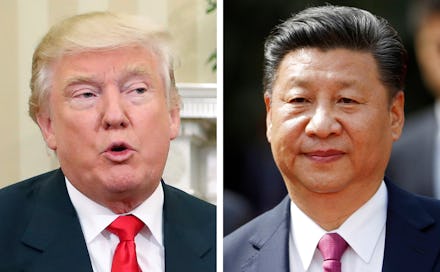China is already firing back against Peter Navarro, Trump's controversial trade adviser

China just fired back against President-elect Donald Trump's increasingly hard-line approach to China — in more ways than one.
First the Global Times, China's partially-state-owned newspaper, published fiery editorial condemning Trump's appointment of Peter Navarro, an economics professor at the University of California at Irvine, to a newly created role overseeing global trade. In the editorial, the newspaper wrote that Navarro's nomination alone "may raise risk of Sino-US conflict."
Then, less than a day later, China announced a nearly $29 million fine against U.S. auto giant General Motors over its "monopolistic pricing."
While Navarro's appointment might seem like small potatoes in the wake of some of Trump's other provocations — which include taking a call from the President of Taiwan and suggesting that a nuclear arms race wouldn't be such a bad thing — there's good reason for China to see Trump's pick as a threat to the relationship between the two countries. (A spokesperson for the Trump Transition team didn't immediately respond to request for comment.)
Navarro is the author of three books, including Death by China: How America Lost its Manufacturing Base, that take a seriously hard-line stance that not only are China's trade practices unfair, they're one of the world's "central problems." Navarro's ideas, however, have drawn broad disagreement from virtually every economist. The New Yorker's Adam Davidson tried — with Navarro's help — but was unable to find a single economist who agreed with Navarro's ideas.
Death by China also became a film that was panned by critics, with one review calling it the "the documentary equivalent of a raving street-corner derelict."
Matt Yglesias, writing for Vox, said that Navarro's and his likely future colleague Wilbur Ross's take on trade is "based on a mistake that would get you flunked out of an AP economics class." Yglesias contends that Navarro and Ross assume that cutting imports automatically increases growth, arguing that Trump's favorite heterodox China experts fail to account for the fact that when you cut the supply greatly (by reducing the number of imports), costs go up. This undermines whatever growth you're creating by protecting U.S. jobs.
The higher costs are no laughing matter. By one estimate, the taxes companies would have to pay on a $100 sweater would jump from $1.75 to $17.
Even if corporations find ways to absorb how much of that price hike gets passed on to consumers, the extra costs could still put certain goods out of reach for some: One survey from ManifyMoney found that many Americans already find the holidays unaffordable, with 1 in 4 taking on debt.
Kenneth Jarrett, the president of the business-friendly American Chamber of Commerce in Shanghai, told CNBC that, despite Navarro's career focus on China, the Trump appointee would soften his stance on China once he got into office.
Money talks, after all.